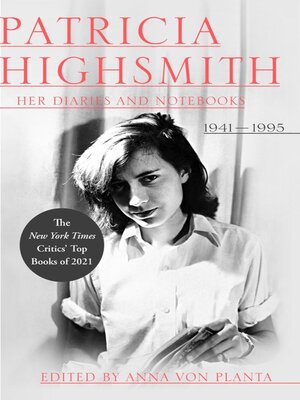
Sign up to save your library
With an OverDrive account, you can save your favorite libraries for at-a-glance information about availability. Find out more about OverDrive accounts.
Find this title in Libby, the library reading app by OverDrive.



Search for a digital library with this title
Title found at these libraries:
| Library Name | Distance |
|---|---|
| Loading... |
New York Times • Times Critics Top Books of 2021
The Times (of London) • Best Books of the Year
Excerpted in The New Yorker
Profiled in The Los Angeles Times
Relegated to the genre of mystery during her lifetime, Patricia Highsmith is now recognized as one of "our greatest modernist writers" (Gore Vidal). Beloved by fans who were unaware of the real psychological turmoil behind her prose, the famously secretive Highsmith refused to authorize a biography, instead sequestering herself in her Switzerland home in her final years. Posthumously, her devoted editor Anna von Planta discovered her diaries and notebooks in 1995, tucked in a closet—with tantalizing instructions to be read.
For years thereafter, von Planta meticulously culled from over eight thousand pages to help reveal the inscrutable figure behind the legendary pen. Beginning with her junior year at Barnard in 1941, Highsmith ritualistically kept a diary and notebook—the former to catalog her day, the latter to brainstorm stories and hone her craft. This volume weaves diary and notebook simultaneously, exhibiting precisely how Highsmith's personal affairs seeped into her fiction—and the sheer darkness of her own imagination.
Charming yet teetering on the egotistical, young "Pat" lays bare her dizzying social life in 1940s Greenwich Village, barhopping with Judy Holliday and Jane Bowles, among others. Alongside Flannery O'Conner and Chester Himes, she attended—at the recommendation of Truman Capote—the Yaddo artist colony in 1948, where she drafted Strangers on a Train. Published in 1950 and soon adapted by Alfred Hitchcock, this debut novel brought recognition and brief financial security, but left a heartsick Highsmith agonizing: "What is the life I choose?"
Providing extraordinary insights into gender and sexuality in mid-twentieth-century America, Highsmith's diaries convey her euphoria writing The Price of Salt (1951). Yet her sophomore novel would have to be published under a pseudonym, so as not to tarnish her reputation. Indeed, no one could anticipate commercial reception for a novel depicting love between two women in the McCarthy era. Seeking relief from America, Highsmith catalogs her peripatetic years in Europe, subsisting on cigarettes and growing more bigoted and satirical with age. After a stay in Positano with a new lover, she reflects in her notebooks on being an expat, and gleefully conjures the unforgettable The Talented Mr. Ripley (1955); it would be this sociopathic antihero who would finally solidify her true fame.
At once lovable, detestable, and mesmerizing, Highsmith put her turbulent life to paper for five decades, acutely aware there must be "a few usable things in literature." A memoir as significant in our own century as Sylvia Plath's journals and Simone de Beauvoir's writings were to another time, Patricia Highsmith: Her Diaries and Notebooks is an historic work that chronicles a woman's rise against the conventional tide to unparalleled literary prominence.







